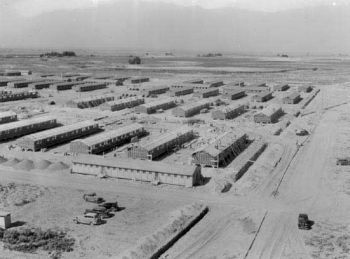
Publisher:
Bonnie King
CONTACT:
Newsroom@Salem-news.com
Advertising:
Adsales@Salem-news.com

~Truth~
~Justice~
~Peace~
TJP
Oct-22-2008 19:23

 TweetFollow @OregonNews
TweetFollow @OregonNews
Group Sues to Protect Idaho's Minidoka Japanese Interment Camp
Salem-News.comA broad coalition of Idahoans and the National Trust for Historic Preservation Sue Jerome County Board of Commissioners over decision allowing factory farming near Minidoka National Historic Site.
 Aerial view of Minidoka during WWII Courtesy: pacificcitizen.org |
(WASHINGTON, D.C.) - The National Trust for Historic Preservation today joined a broad coalition of Idahoans and state and national organizations as a co-plaintiff in a lawsuit appealing a decision by the Jerome County Board of Commissioners on September 23, 2008 to approve an application for a confined animal feeding operation, or 'CAFO' permit near the Minidoka National Historic Site in Idaho.
The National Trust for Historic Preservation joined with Japanese American Citizens League, Friends of Minidoka, Preservation Idaho, Idaho Concerned Area Residents for the Environment (ICARE), the Idaho Rural Council, and local farming families and landowners, the Dimonds and Slones, in filing the Petition for Judicial Review. These groups are deeply concerned about the consequences that this CAFO will have on adjacent property and Minidoka.
The petition challenges the Board’s approval based on its inadequate consideration of the impacts to Minidoka and private property, and exclusion of the opportunity for the coalition members to participate in the process in violation of their due process rights.
The Board made its decision based on an Idaho law that limits public testimony on a CAFO application to persons with a “primary residence” within just one mile of a proposed facility. Minidoka is 1.2 miles from the proposed CAFO site, and the coalition contends the CAFO will likely cause foul odors, harm air and water quality, and create elevated noise and traffic near Minidoka.
In 2007, the National Trust for Historic Preservation listed the Minidoka National Historic Site as one of America’s 11 Most Endangered Historic Places because of the proposed CAFO facility and deteriorating conditions at the site.
Japanese/American Internment Camp
The Minidoka Relocation Center, a World War II-era internment camp for Japanese Americans and their immigrant ancestors, operated from August 1942 to October 1945, housing 13,000 internees from Washington, Oregon and Alaska on a 33,000-acre site with over 600 buildings.
Designated a National Monument in 2001 under the auspices of the National Park Service, the site, visited annually by thousands, tells stories about wartime division and subsequent post war unification and settlement. Earlier this year, Congress passed legislation to expand Minidoka and call it a National Historic Site.
“Litigation is not action the National Trust for Historic Preservation takes lightly,” said Richard Moe, president of the National Trust for Historic Preservation. “However, the importance of Minidoka to Idaho and the nation warrants vigilance and scrutiny to prevent harm to this nationally significant site.”
"The Minidoka National Historic Site is a special example of the American WWII experience," said Emily Hanako Momohara, Chair of Friends of Minidoka.
"The story of Minidoka and those held there, how the camp affected the community, and the consequent agricultural benefits to the area are found at the Minidoka site.“ Ms. Momohara emphasized, "this coalition of local and national groups and individuals is working in unison to preserve Minidoka's story, so that all Americans have an opportunity to visit and learn from it."
Alma Hasse, Executive Director of ICARE, added, “this broad coalition of groups and individuals underscores the concern raised by this proposed CAFO. Our collective fight to insure that Minidoka and other surrounding properties are free from harmful impacts is without precedent in Idaho.”
“The process of approving the permit excluded information needed by the Board to make a sound decision that protected the rights of all involved, not just those of the applicant,” stated Charlie Tebbutt, attorney for the coalition.
The coalition is represented by Charlie Tebbutt of the Western Environmental Law Center based in Eugene, Oregon, Patrick Brown of Twin Falls and Richard Carlson of Filer. The Western Environmental Law Center is a nonprofit public interest law firm that works to protect and restore western wildlands and advocates for a healthy environment on behalf of communities throughout the West.
For more information visit: PreservationNation.org.
Articles for October 21, 2008 | Articles for October 22, 2008 | Articles for October 23, 2008
Quick Links
DINING
Willamette UniversityGoudy Commons Cafe
Dine on the Queen
Willamette Queen Sternwheeler
MUST SEE SALEM
Oregon Capitol ToursCapitol History Gateway
Willamette River Ride
Willamette Queen Sternwheeler
Historic Home Tours:
Deepwood Museum
The Bush House
Gaiety Hollow Garden
AUCTIONS - APPRAISALS
Auction Masters & AppraisalsCONSTRUCTION SERVICES
Roofing and ContractingSheridan, Ore.
ONLINE SHOPPING
Special Occasion DressesAdvertise with Salem-News
Contact:AdSales@Salem-News.com

googlec507860f6901db00.html



Terms of Service | Privacy Policy
All comments and messages are approved by people and self promotional links or unacceptable comments are denied.
[Return to Top]
©2025 Salem-News.com. All opinions expressed in this article are those of the author and do not necessarily reflect those of Salem-News.com.